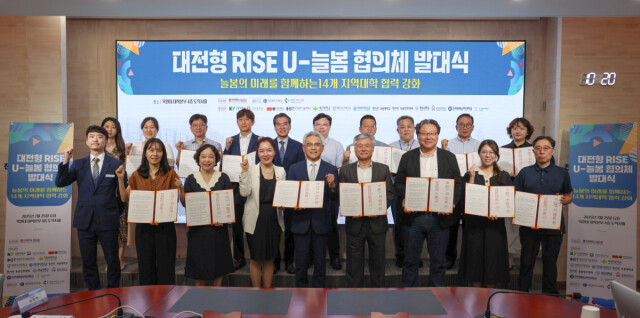
Fourteen universities in the Daejeon area have officially launched the 'RISE U-Neulbom Council' to foster Neulbom School instructors and improve the quality of their programs. This initiative aims to prevent the outflow of excellent human resources, with local universities collaborating to share the responsibility of childcare and contribute to public education innovation.
On July 31st, 14 universities in the Daejeon area, including Mokwon University (the leading institution), Konyang University, Hanbat National University, Daedeok University, Daejeon Institute of Science and Technology, Daejeon University, Daejeon Health Institute of Science and Technology, Pai Chai University, Woosong University, Woosong College of Information, Chungnam National University, Hannam University, Korea Baptist Theological University/Seminary, and Korea Polytechnic IV Daejeon Campus, gathered to hold the 'Daejeon-type RISE U-Neulbom Council Inauguration Ceremony.' This council is linked to the RISE (Regional Innovation System for Education) framework, a region-centered education innovation model, and aims to support the successful establishment of Neulbom Schools by utilizing the human and educational resources of universities.
Establishing a Joint Instructor Training System Through Consortium
Until now, each university had individually conducted Neulbom instructor training. Now, this will be integrated and operated under a single joint system called the 'RISE U-Neulbom Council.' This is expected to maximize efficiency by bringing together excellent human resources and educational content that were previously dispersed among universities, further enhancing the professionalism of Neulbom instructors. Beyond simply training instructors, the council plans to promote the stable operation of Neulbom Schools by encouraging excellent personnel to settle in the region.
Enhancing and Advancing the Quality of Neulbom School Programs
The universities participating in the council will jointly plan and operate Neulbom School programs that reflect each university's specialized majors and educational capabilities. For example, universities strong in arts and physical education will offer creative arts education programs, while science and technology universities will provide inquiry-based STEAM education. Through this collaboration, Neulbom Schools are expected to evolve beyond simple childcare functions into venues that offer diverse and high-quality educational opportunities to students. This will likely strengthen the public nature of education and positively impact the reduction of reliance on private education.
Expert Lectures and Working-Level Consultations for Practical Cooperation
During the inauguration ceremony, active discussions also took place regarding the practical promotion of the council. Kim Jin-ho, a manager from the Daejeon Metropolitan City Office of Education, emphasized the differences from existing Neulbom Schools and the necessity of this council, expressing his commitment to policy support. Additionally, Lee Seung-jun, Director of Mokwon Smart School, shared successful case studies of after-school program operations over the past 12 years, offering concrete ideas for business advancement. These suggestions from experts are expected to clearly indicate the direction the council should take and play a crucial role in resolving practical difficulties.
A Cornerstone for Regional Co-prosperity and Building an Educational Ecosystem
Mokwon University President Lee Hee-hak praised the launch of this council as "a valuable first step for regional universities to innovate public education on the basis of co-prosperity." He also emphasized that "it is time for universities to unite to nurture talent that will lead the region's future and create an educational ecosystem that grows together," suggesting that this will serve as an opportunity to redefine the role of regional universities.
The Ministry of Education plans to fully expand Neulbom Schools nationwide starting in 2025, and the role of universities is essential for their stable establishment and qualitative improvement. In particular, the human and material resources held by regional universities will be a great asset in securing the diversity and professionalism of Neulbom School programs. This 'RISE U-Neulbom Council' demonstrates the potential for expansion to other regions, starting with Daejeon, and presents a new educational cooperation model where regions and universities can co-prosper. Ultimately, this is expected to be an important step contributing to student growth and regional development.
[Copyright (c) Global Economic Times. All Rights Reserved.]






























